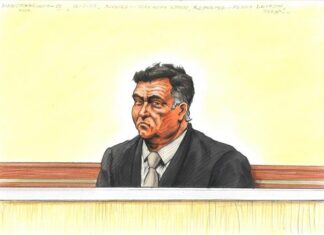Brad Porter had never seen a polocrosse match until the day he played in one. But he knew how to manage a stock horse. He’d been a rider from the time he could reach the saddle.
It was during a weekend at Sale with his brother Philip six years ago that Brad, 25, of Macclesfield, joined the Corio team, and since then the brothers have won four Victorian championships at various levels of competition.
Brad is aiming now for a permanent place in the Corio A-grade team.
“Polocrosse is a lighter version of polo,” he says.
Both sports use stock horses for their speed, stamina, agility, intelligence, and control.
Brad describes the sport as like a football match on horseback, with goalshooters, centremen, and defenders.
Six riders make a team. In polo, one rider has a string of horses; in polocrosse, the rider is allowed only one horse.
According to the Polocrosse Association of Australia, the game is one of only three Australian-made sports, the other two being Australian rules football and two-up.
In a curious mixture of polo, netball, and lacrosse, the rider carries a cane stick with a squash-racquet-like head to contain a ball.
Playing fields and tournaments are sparse across the country, so for Brad the journey to his weekend sport can take several hours.
So keen is Brad, that in 2003 and in 2007 he was among thousands of spectators at the world cup in Warwick in Queensland. The quadrennial event is the Olympics of polocrosse.
From the sidelines, he watched, but in his mind he knew he wanted to eventually join a state or national team himself.
“The game is popular in the United States,” he says.
But it is the Australian stock horse that interests the Yankee players.
“They are looking at our horses and want to take them back to the US.”
The words come from a young man who has made horses his hobby and his career.
Brad’s parents Ros and Quentin own the Yarrangui Australian Stock Horse Stud, renowned for the award-winning stallion Talisman Fiddler.
“We were just kids when Mum brought home our first stock horse, a yearling filly,” Brad says.
Ros was an international equestrian, a horse breeder, and a lover of the land, so it was no surprise when her two sons took up work in the horse industry.
Brad is a farrier by trade and winner of the 2003 apprentice of the year award. He worked for a year in Canada, and now from his Macclesfield home he looks after stables near and far, including stables at Cranbourne and Flemington race tracks.
He found his true profession early.
“I was lucky. Many people leaving school don’t know what they want to do, but I knew by the time I was 14.”
On his own initiative, Brad set up B.J. Porter Master Farriers, now a thriving business.
Like the veterinary surgeon and the animal welfare officer, the farrier is on standby at racing and equestrian events.
“When I go out to properties, every job can be different from the one before.”
He might be carrying out routine maintenance or he might be preparing horses for shows or dressage.
At the family’s stock horse stud in Macclesfield, Brad has learned the science of horse breeding and showing. This is why he took so easily to polocrosse, a sidekick to his work and the highlight of his week.
“To raise a good stock horse we need to develop in the horse a sound mind, reliability in riding and working, and abilities in dressage and time trials.”
The Australian stock horse developed from horses that arrived in Australia on the first fleet in 1788. Soon after, the colonists imported hardy desert horses including Arabians and Barbs from the Barbary coast of north Africa, and then English and Spanish thoroughbreds and Welsh mountain ponies.
Breeders in the 1830s gradually attempted to improve the strains, resulting in the distinctive and versatile Australian stock horse.
At the family stud, Brad has had the opportunity to work with horses from outstanding bloodlines, including the stallion Talisman Fiddler. His aim is to compete on Fiddler’s progeny.
“We have high expectations of this horse,” he says.
Brad likes putting something back into the sport that gives him such pleasure, so he visits pony clubs to teach riding skills to youngsters, and along the way he can share his expertise on all aspects of the Australian stock horse.
A horseman’s hobby
Digital Edition
Subscribe
Get an all ACCESS PASS to the News and your Digital Edition with an online subscription
Accused murderer makes bail bid
Accused murderer Greg Lynn is not an unacceptable risk to the community, his lawyers have argued as he makes a bid for freedom.
Lynn, 59,...







